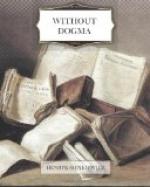My consciousness of self is highly developed. At times I feel inclined to send that second self to the devil, that self which does not permit yielding to any sensation, but is always there, searching, criticising every action, feeling, delight, or passion. “Know thyself” may be a wise maxim, but to carry about one’s self an ever watchful critic deadens the feeling, dividing as it were your soul in two parts. To exist in a state of mind like this is about as easy as for the bird to fly with one wing. Besides, selfconsciousness too much developed weakens the power of action. But for this, Hamlet would have made a hole in his uncle in the first act, and with the greatest composure taken possession of the throne.
As far as I am concerned, it sometimes protects me or saves me from heedless slips, yet more often tires me, preventing absolute concentration upon one point of action. I carry within me two beings,—the one that protests and criticises, the other leading only half a life, losing gradually all power of decision. I am afraid I shall never free myself from that yoke; on the contrary, the more my mind expands, the more minute will be the knowledge of self, and even on my deathbed I shall not leave off criticising the dying Ploszowski unless disease has fogged my brain.
I must have inherited from my father a synthetic mind, because I always try to generalize matters, and for that reason science attracts me more than philosophy. In my father’s time philosophy embraced no more nor less than the whole universe and all being; consequently it had a ready answer for all questions. In our times it has become rational in so far as to confess that it has ceased to exist in the old meaning of the word and remains only as a philosophy of special scientific branches. Truly, when I come to think of it it seems that the human mind too has its tragedies, and it began by confessing its own powerlessness. As I write a personal diary I will treat these matters from a personal point of view. I am not a professed philosopher, because I am nothing by profession; but as a thinking being I am interested in the new philosophic movement; I have been and am under its influence, and have a full right to speak about what entered the composition, and contributed to the creation, of my moral and intellectual being.
To begin with, I note down that my religious belief I carried still intact with me from Metz did not withstand the study of natural philosophy. It does not follow that I am an atheist. Oh, no! This was good enough in former times, when he who did not believe in spirit, said to himself, “Matter,” and that settled for him the question. Nowadays only provincial philosophers cling to that worn-out creed. Philosophy of our times does not pronounce upon the matter; to all such questions it says, “I do not know!” and that “I do not know” sinks into and permeates the mind. Nowadays psychology occupies itself with close analysis and researches




